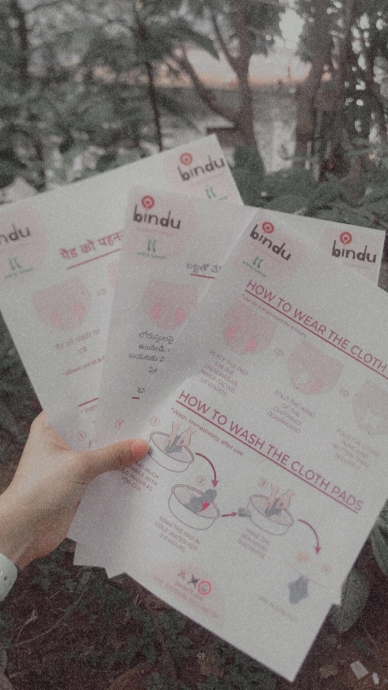With the onset of the COVID-19 pandemic, many women across India were negatively impacted, especially when it came to their menstrual hygiene. These women faced massive shortages of sanitary napkins, forcing them to resort to using unhygienic and unsafe methods of menstrual hygiene, such as using dirty cloths and ash instead. To help some of these communities in India, Project Bindu was launched by students at the Aga Khan Academy (AKA) Hyderabad to procure and distribute sanitary napkin kits.
Project Bindu is a part of an initiative called Bindu, which means “stop” or “dot” in Hindi. Inspired by Ziyaan Virji, Class of 2020, and his work at the Aga Khan Academy Mombasa towards raising awareness about period poverty in East Africa, students at AKA Hyderabad saw the numerous issues surrounding menstruation in India and wanted to put an end to it. Established in 2019, Bindu, which is led by Class of 2020 alumni Iliyan Hariyani and Ananya Shah, was created in response to this.
"I personally had no idea what menstruation exactly meant until I learned about it in my Biology classes,” Iliyan said. “Much of our society is plagued with this ignorance due to false connotations of impurity and shame associated with menstruation. I co-founded Bindu because I wanted to educate people, especially non-menstruators, and help replace their ignorance with a true understanding of what menstruation really means."
aka-india-bilingual_leaflets_created_by_bindu_to_raise_awareness_on_how_to_maintain_proper_menstrual_hygiene.jpg

Bindu’s first project, Project Bindu, was launched in May in partnership with Heena’s Tailoring Unit, a Hyderabad-based tailoring unit, and the Kriya Sangh Society, a non-profit organisation aimed at helping low-income individuals in Hyderabad. This project focused on the production and distribution of sanitary napkin kits. The Aga Khan Foundation India and Good Universe, an equal rights non-profit organisation working with women, children and transgender people in Hyderabad, also played instrumental roles in helping the students reach out to the distributors. Through fundraising online and receiving a US$ 1,000 grant from the Pollination Project, a California-based organisation providing seed grants for social change projects, the students were able to provide 1,000 cloth-based, reusable sanitary napkins to women in the Rasoolpura region of Begumpet, Hyderabad.
With the success of their first project, Bindu launched eight more, currently ongoing, projects to support daily wagers, migrant workers and other individuals from marginalised communities in Hyderabad, parts of Andhra Pradesh, Mumbai and Jharkhand. Not only were these individuals impacted by the pandemic, but also by the floods causing damage to people’s livelihoods. Through these projects, Bindu partnered with multiple organisations: the Go Girl Foundation, a menstrual hygiene education organisation in India, the Choice Foundation, a Hyderabad-based non-governmental organisation providing health care to children from socio-economically challenged backgrounds, Fueladream.com, an online crowdfunding platform, and Akshaya Patra Foundation, a non-profit organisation in India that provides school lunch programmes. Through these projects, menstrual hygiene products, including reusable and sustainable Relief Pads and undergarments are being provided to more than 4,000 menstruators. In addition, through various fundraisers and grants, Bindu also collected around US$ 17,500 to fund their ongoing projects.
To encourage more students to participate in their cause, Bindu reached out to other International Baccalaureate (IB) schools in Hyderabad. "Working with other schools gave Bindu an opportunity to influence today's youth and encourage them to become ambassadors for the cause,” DP1 student Mahek Charania said. “After all, we are the future generation!"
For its future, Bindu is working on creating educational courses on menstruation for adolescents in both urban and rural schools across India, which will be implemented in the coming months. The courses will focus on menstrual education before the onset of periods for girls and on de-stigmatising periods for boys.
“At Bindu, we strive to look for areas not covered by the media,” Ananya said. We look for the rural, semi-urban and disaster-prone areas whose people are in dire need of our resources. By 2025, it is our goal at Bindu to provide sustainable menstrual kits to at least one million girls in and around India. We will tackle period poverty one period at a time!”
Latest On AKDN




